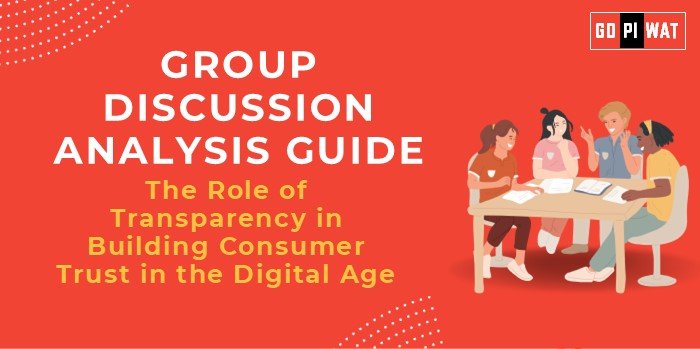📋 Group Discussion Analysis Guide
🌐 Topic: The Role of Transparency in Building Consumer Trust in the Digital Age
💡 Introduction to the Topic
- Opening Context: “In an age where data breaches and misinformation are rampant, transparency has emerged as the cornerstone for building consumer trust in digital businesses worldwide.”
- Topic Background: The digital revolution has accelerated businesses’ access to vast consumer data, but with it comes concerns of misuse, privacy violations, and unethical practices. Transparency—a commitment to open, clear, and honest communication—has become critical for earning and maintaining consumer trust. Recent developments like the GDPR, growing calls for ethical AI, and increased digital literacy have intensified the global focus on transparency as a trust-building strategy.
📊 Quick Facts and Key Statistics
- 🔍 Consumer Skepticism: 86% of consumers demand greater transparency from brands about their data usage (Label Insight, 2023).
- ⚠️ Data Breaches: 22 billion records were exposed globally in 2023, eroding digital trust (Cybersecurity Ventures).
- 🤝 Impact of Trust: Brands perceived as transparent report up to 94% customer loyalty (Forbes Insights, 2024).
- 🌐 India Context: Over 759 million Indians are active internet users; transparency is pivotal to maintaining trust (IAMAI Report 2024).
👥 Stakeholders and Their Roles
- Businesses and Corporations: Implement transparency policies, such as clear privacy statements and ethical data usage.
- Government and Regulators: Establish legal frameworks like GDPR, India’s Digital Personal Data Protection Act, and enforce accountability.
- Consumers: Push for ethical practices through preferences and informed decisions.
- Technology Providers: Enable tools that promote ethical AI, blockchain-based transparency, and secure systems.
✅ Achievements and Challenges
Achievements:
- 🌐 Increased Adoption of Transparency Tools: Blockchain and open data platforms enhance supply chain visibility and consumer awareness.
- 🤝 Consumer Loyalty: Brands like Patagonia and Microsoft have successfully used transparency to boost trust.
- 📋 Legislation Growth: Regulations like GDPR in the EU and India’s DPDP Act have encouraged better data governance.
- 🤖 AI Transparency: Frameworks for ethical AI (e.g., explainable AI) have emerged globally.
Challenges:
- ⚠️ Cybersecurity Threats: Rising cyberattacks challenge trust efforts (e.g., AIIMS 2022 ransomware attack in India).
- 📉 Lack of Awareness: Low digital literacy in rural areas undermines transparency initiatives.
- 🟢 Greenwashing and Tokenism: Businesses misrepresent efforts to appear ethical, reducing genuine transparency impact.
🌍 Global Comparisons
- 🇪🇪 Estonia: A leader in e-governance transparency, using blockchain for secure and visible public records.
- 🇪🇺 EU (GDPR): Robust data privacy policies have increased consumer trust.
- 🇮🇳 India: The Digital Personal Data Protection Act (2023) is a step towards greater data transparency and consumer empowerment.
Case Study: Unilever launched a full transparency program for product sourcing and supply chains, significantly improving consumer trust.
📚 Structured Arguments for Discussion
- Supporting Stance: “Transparency fosters accountability and builds long-term trust by ensuring consumers have visibility into a company’s practices, data policies, and ethics.”
- Opposing Stance: “Absolute transparency can compromise competitive advantages, increase operational costs, and still fail to prevent skepticism among hyper-aware consumers.”
- Balanced Perspective: “While transparency is essential for trust, its implementation must balance ethical commitments with realistic business competitiveness and consumer education.”
💬 Effective Discussion Approaches
- Opening Approaches:
- 📊 “Did you know 94% of customers are loyal to transparent brands? This highlights the critical role of openness in trust-building.”
- 🔐 “Imagine trusting a business with your data only to find it misused—this is the risk businesses face without transparency.”
- Counter-Argument Handling:
- Rebuttal: “While full transparency may seem costly, failing to adopt it often leads to greater losses, as seen in cases like Facebook’s data privacy scandals.”
🧐 Strategic Analysis of Strengths and Weaknesses
- Strengths: Enhances customer loyalty and brand image, encourages ethical operations and accountability.
- Weaknesses: High costs of implementation, risk of information misuse or oversharing.
- Opportunities: Use of AI and blockchain for visible, secure transparency, growing consumer demand for corporate honesty.
- Threats: Cybersecurity breaches, misinformation undermining genuine efforts.
📖 Connecting with B-School Applications
- Real-World Applications:
- Strategic discussions on privacy laws in operations or marketing projects.
- Transparency as a competitive differentiator in case studies.
- Sample Interview Questions:
- “How can companies balance transparency with competitive strategy?”
- “What role does transparency play in addressing data privacy concerns?”
- Insights for B-School Students: Focus on ethical leadership and digital governance strategies. Use transparency frameworks in projects to address consumer trust concerns.


